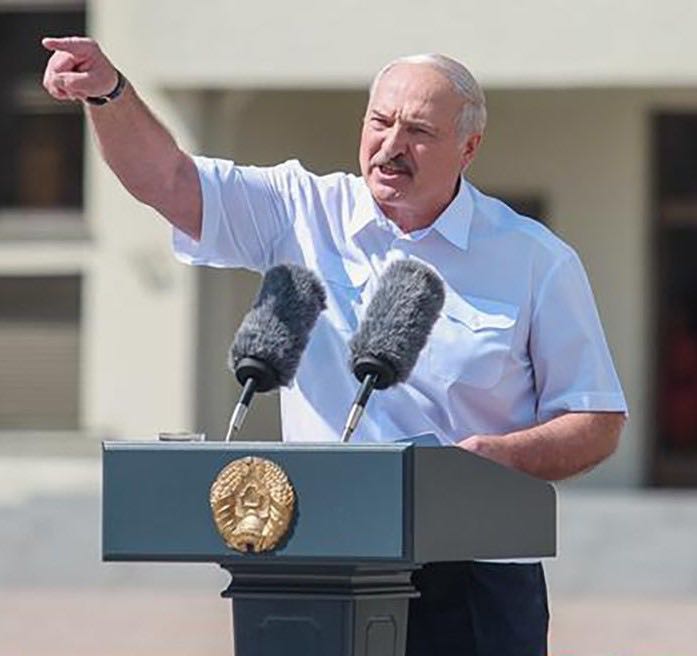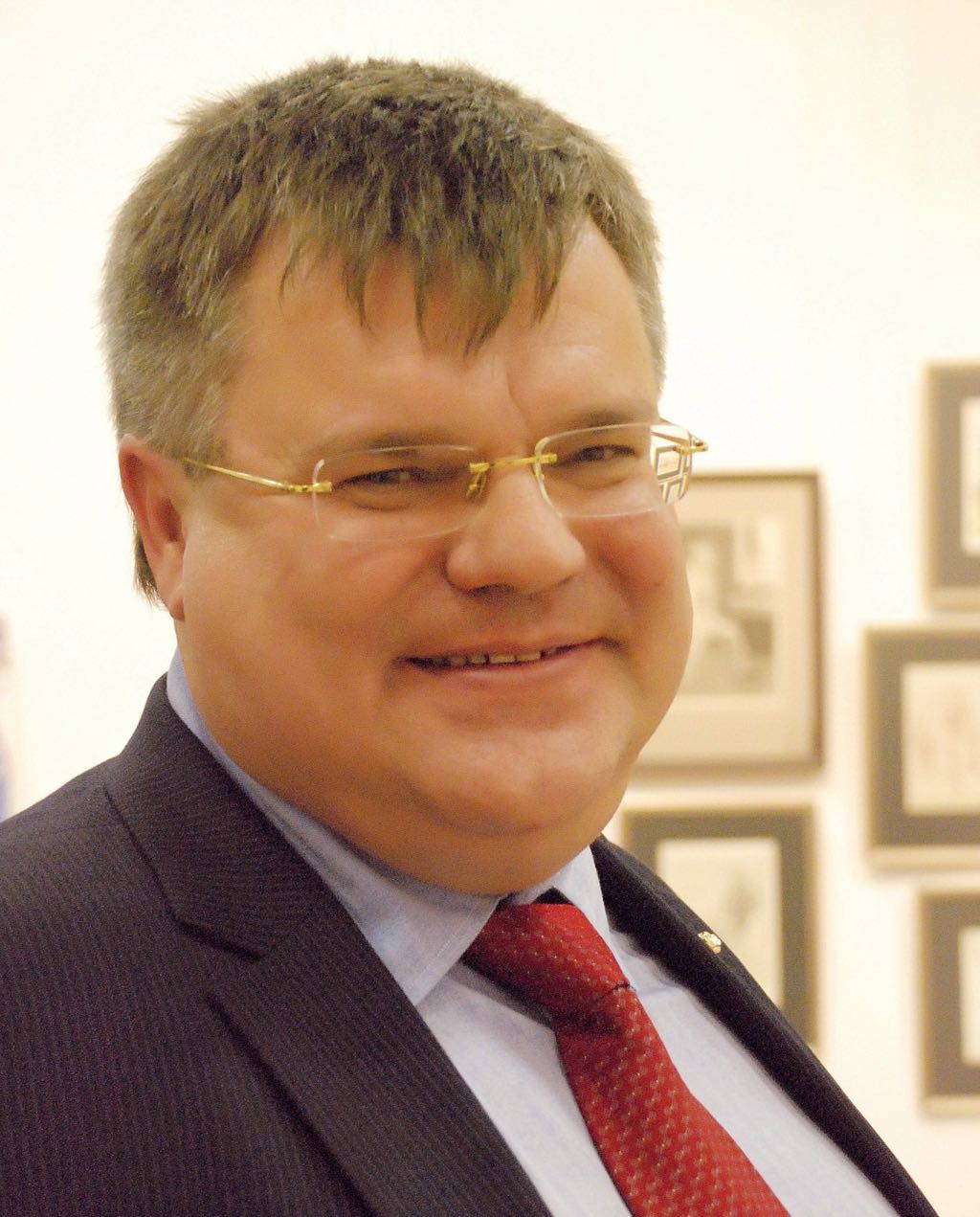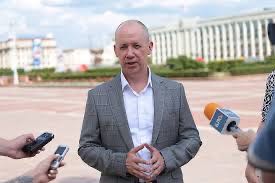Belarusians must chart their own future. The West can encourage them but it's too presumptuous and too counter-productive to tell them how to act. In the meantime, sanctions are ineffective and might actually make Belarus more dependent on Russia, argues Mark Galeotti. The West should provide practical aid and comfort. And Lukashenko should no longer be referred to as the president of Belarus. It’s a symbolic measure, but symbolism matters in politics.

Lukashenko at his own support-meeting in Minsk. Picture Tut.By
As Alexander Lukashenko’s critically-wounded regime slinks towards its endgame, whether that means collapse or some bloody attempt at resurrection-by-repression, there is an inevitable call in the West for Something To Be Done. The problem is that such crises – fast-moving, unpredictable, involving a largely isolated elite – do not lend themselves to the usual instruments of diplomacy, and well-meaning foreigners actually have all kinds of opportunities to make the situation worse.
The foundational principle of the medical profession – first do no harm – is one that could usefully be adopted by would-be geopolitical saviours. When a corrupt leader falsifies an election on such a gratuitous scale, when huge and peaceful crowds are out on the streets and being met with brutal police actions, when opposition candidates are arrested or forced into exile by implicit threat to their families, then the desire to do something is understandable and sometimes irresistible.
The risk is that in order to make ourselves feel better, we act in ways that actually worsen the situation.
This is about Belarus…
One of the particular problems is the extent to which some outside observers will insist on seeing this not simply as a struggle between Belarusians and a regime which has denied them their democratic rights, but as simply one more battlefield in a wider struggle between Russia and the West or, as they see it, authoritarianism and freedom.
In this formulation, Vladimir Putin is driven by an essential and existential commitment to destroy democracy wherever it may sprout. He is thus, they argue, necessarily on Lukashenko’s side, and will seek to help stamp out the revolution. The West therefore needs to deter Russia from heavy-handed intervention, with warnings and possibly even direct help for the anti-government forces.
However sincere those who advocate this view, when it comes to the Belarus crisis, they are not just wrong, but dangerously wrong. Putin shows no sign of caring what system elevated a government, just about the policies it enacts. He may not have liked the way Nikol Pashinyan toppled Serzh Sargsyan in Armenia, but once he made it clear that democratisation at home was not going to mean challenging Erevan’s relationship with Moscow, Putin seems to have had no further concerns. Nor is there any constituency at home, even in the Kremlin, for a further ‘gathering of the Russian lands’, let alone a fear that regime change in Belarus would somehow change the political algorithm in Russia.

Viktor Babariko. Picture Wikimedia
At present, the protests in Belarus are anti-Lukashenko, not anti-Moscow or even pro-West. Indeed, opposition leaders Viktor Babariko and Valery Tsepkalo appear entirely acceptable to the Russians, and even Svetlana Tikhanovskaya, while accepting sanctuary in Lithuania, has in no way presented this as a drive to ‘move West’. While Lukashenko – having previously sought to present Russia as interfering in Belarusian politics – has appealed to Moscow for help, there is no enthusiasm for him there: he has, to be blunt, toyed with them and flirted with the West once too often.
…So Keep it that Way
Of course, that doesn’t mean that Russia absolutely would not intervene under any circumstances. There are already accounts of National Guard on the move. Having already in effect ‘lost’ Ukraine, Vladimir Putin likely would be unwilling to accept the prospect of also seeing Belarus adopt an openly pro-Western orientation. That said, it does not mean he would necessarily try and keep Lukashenko in power, as he may feel a less toxic and more malleable candidate was needed.
Over-bullish overtures, or direct attempts to induce the opposition into a pro-Western orientation run the risk of triggering the paranoid hawks who dominate the Kremlin and make them fear that their nightmare scenario is imminent. Remember: they assume the West is much more capable, strategic and ruthless than it really is. Empty rhetoric may be the stuff of Western politics, but many in Russia take it at face value. If we over-promise, then we may actually mislead Moscow about our intent – and our interest.
Much the same is true of warnings and threats to Moscow. What can be intended as deterrence from one side of a barricade can sound like a challenge on the other, again especially to the current Kremlin clique. A regime that is painfully aware of the fragility of its international position may feel it has no option but to respond to such a challenge – even where none was intended.
As Anna Arutunyan has argued, this may be a time for the EU to reach out to Moscow and suggest some kind of common action. Frankly, it is unlikely this will actually come to anything. But it would crucially signal that Europe is not seeing this as some kind of Russia-versus-the-West tug-of-war – one in which Moscow can and would pull rather harder. Disarming the hawks in Moscow (and in the West, for that matter) can help ensure Belarus has the space to try and resolve the crisis itself.
Meanwhile, if Russia did look as if it might still be inclined to intervene, as Hubert Smeets has noted, the 1994 Budapest Memorandum could be used as the basis for international pressure to prevent or dislodge it.
Sanctions, sanctions, always sanctions
The inevitable talk is of sanctions, which has become the West’s go-to instrument of choice. They are non-violent, play to Western economic and cultural strengths, and usually cheap and politically uncontroversial. They are also pretty ineffective, but never let that stop anyone.
Already there has been talk of imposing new sanctions on Belarus. They do have a genuine value as a clear expression of anger and revulsion, of giving some substance to the usual bland diplomatic statements of concern. Beyond that, though, their value is unlikely to be substantial.

Valery Tsepkalo. Picture Wikimedia
Lukashenko is in the fight for his life, certainly politically and maybe even literally. In that context, nothing short of a crippling economic blow that would ruin millions of ordinary Belarusians is going to shift him. He does not have massive assets stashed abroad that could be frozen, and nor do the key security figures on whom he currently is having to rely.
Sectoral economic sanctions might actually make Belarus more dependent on Russia, and certainly would have no practical impact in the time frame of this crisis. Sanctions on specific individuals are unlikely to have a real effect, and in any case the EU doesn’t feel it could have anything in place before late August or September: if Lukashenko is still in power by then, he probably will have survived this revolution.
Besides, there is a credibility issue here. The EU imposed sanctions on Minsk in 2004, then lifted most of them in 2016 in the hope of a closer relationship with Lukashenko’s regime at a time when he seemed to be moving away from Moscow. Having already given the appearance that geopolitics trumps morality, can it truly expect that the ‘last dictator in Europe’ will take them seriously next time? With a specific set of exceptions, of which more below, it is not that sanctions are harmful, just that they are largely irrelevant.
Aid and comfort
Not turning Belarus into a great power battleground and not assuming sanctions offer any magic solution does not mean abandoning Belarus, though. There is much that can be done – but largely as a collection of small-scale initiatives and also driven by the interests and also the desires of the Belarusians themselves. After all, it is worth remembering that Tikhanovskaya has stressed that this is a domestic matter, and opposition leader Maria Kolesnikova, formerly Babariko’s campaign manager, has warned against economic sanctions.
As Belarusian state TV newsreaders themselves abandon their posts as propaganda mouthpieces for the state, the scope for the Western media not just to keep the spotlight on the regime’s abuses but also to keep broadcasting truly accurate and impartial news to Belarus through every channel becomes all the more important.
Defectors, opposition figures and agitators ought to be given asylum, along with their families. This is a regime which, even when facing less serious challenges, has a track record of ‘disappearing’ such enemies and using – as the Tikonovskies attest – families as leverage.
Lukashenko should no longer be referred to as the president of Belarus. It’s a symbolic measure, to be sure, but symbolism matters in politics.
While Belarus’s leaders have much more to fear from a loss of power than Western sanctions, they depend on thousands of officials to execute their brutal and venal orders. A more effective use of the sanctions weapon might be to threaten that anyone, for example, serving as a police officer would automatically be denied a visa to Europe. The point is to communicate that there are consequences to continuing to prop up this moribund regime.
None of these measures represent a ‘silver bullet’ solution, and they will generally lack the heroic scale to satisfy the most ardent of the Something Must Be Done crowd, but they are all meaningful and unlikely to worsen the situation.
Above all, Belarusians must be allowed to chart their own future. We can encourage them and cheer them on, we can do what we can to deter the gratuitous brutality of Lukashenko’s regime. It is, however, too soon, too presumptuous and too counter-productive to be presuming to tell them how to act, what reforms their economy needs, where to look in the future.
